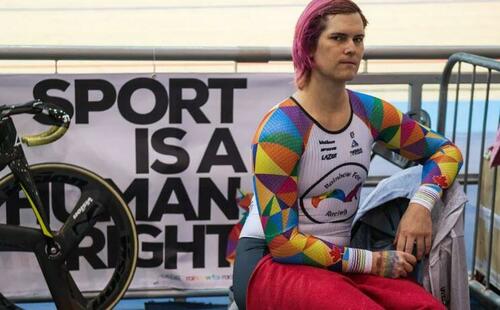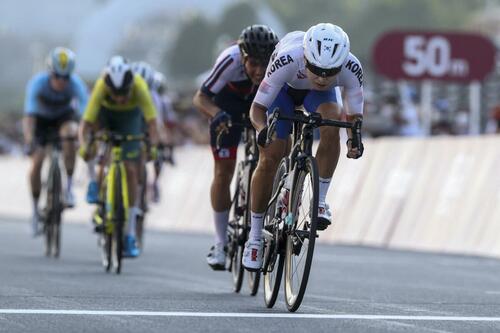
The Union Cycliste Internationale (UCI), the governing body of sports cycling, announced on Friday that transgender female cyclists will not be allowed to compete in international women's eventsif they have "transitioned after puberty."
"From now on, female transgender athletes who have transitioned after (male) puberty will be prohibited from participating in women's events on the UCI International Calendar – in all categories – in the various disciplines," the statement reads, according to Fox News.
According to a press release published Friday, the UCI decided to adapt the rule during a July 5th meeting with athletes and other experts, including human rights, scientific, and legal experts.
"First of all, the UCI would like to reaffirm that cycling – as a competitive sport, leisure activity or means of transport – is open to everyone, including transgender people, whom we encourage like everyone else to take part in our sport,” UCI President David Lappartient said in the release.
“I would also like to reaffirm that the UCI fully respects and supports the right of individuals to choose the sex that corresponds to their gender identity, whatever sex they were assigned at birth.”
"However," Lappartient noted - having got the politically-sensitive comment out of the way - The UCI "has a duty to guarantee, above all, equal opportunities for all competitors in cycling competitions."
"It is this imperative that led the UCI to conclude that, given the current state of scientific knowledge does not guarantee such equality of opportunity between transgender female athletes and cisgender female participants, it was not possible, as a precautionary measure, to authorize the former to race in the female categories," Lappartient said.
Common sense rules once again...
The UCI's decision comes just a day after a South Korean man who identifies as a transgender female has competed and won a cycling race to make a point that trans athletes are physically stronger, deeming them “selfish.”
As The Epoch Times reports, Na Hwa-rin, 37, has undertaken gender reassignment surgery and was officially recognized as a woman in Seoul last year, including a reissue of his birth certificate in April. He competed and won a cycling competition at this year’s Gangwon Sports Festival in eastern Gangwon Province in the female category to prove a point, reported The Korea Times.
“I have no unresolved feelings over winning because that’s no longer what I want. My goal was to stir controversy and get my story heard by competing,” Mr. Na told the outlet on June 23.

In seeking to prove a point, Mr. Na described feeling “more relieved than triumphant” when he crossed the finish line of the race. He set out to demonstrate that biological men are physically superior when it comes to transgender athletes competing in female categories.
Mr. Na outstrips his female competitors with his physicality, standing at about 5.9 feet tall and weighing roughly 158 lbs, with a skeletal muscle mass of 72 lbs, the outlet reported.
Feeling embarrassed about his win, he told the outlet that he offered the female cyclists who lost to him energy drinks by way of an apology for stealing their glory. Mr. Na, who comes from a Christian family, noted that he chose that competition because it was a provincial event, not a professional race that could harm the career of a professional female athlete.
“I am not honored. I am not proud of myself at all. I believe other transgender athletes would feel the same way,” he said. “They may not want to admit it,” he added, referring to international trans athletes, “but they’re being selfish. There is no honor as an athlete in that.”
Mr. Na’s win drew support from LGBT advocates but sparked debate in South Korea about the fairness of men who identify as women competing against females in sports. His desire for fairness held him back from trying to qualify for the National Sports Festival.
“I don’t want to make an issue to the point where I harm other people,” he said.
Advocating for a ‘3rd Gender’ Sports Category
Mr. Na developed a love for cycling by riding his bike around nine miles to school every day. He later competed professionally as a cyclist, winning competitions in the men’s categories.
“The sport gave me a sense of thrill and accomplishment and the catharsis of overcoming my limitations,” he said.
He now advocates for a “third gender” category in sports competitions, believing that trans athletes should not compete alongside men and women.
“It could be like how we have many weight divisions in some sports,” Mr. Na said. “Under the current binary system, women athletes will be discouraged and their hard work might not be recognized due to the participation of transgender athletes.
“At the same time, trans woman athletes, no matter how hard they worked, will never be truly honored for their wins,” he continued. “Honor is the goal that all athletes aspire to attain, but this is a situation where nobody will be honored. I think that shouldn’t happen.”
Owing to the lack of gender-specific regulations for athlete qualification by both the Gangwon State Sports Council and the Korean Sports and Olympic Committee, Mr. Na was eligible to participate in the provincial competition, The Korea Times reported.
Mr. Na now works as an asparagus farmer in his hometown, Cheorwon, located roughly 43 miles northeast of Seoul, bordering North Korea.
He said that he began to experience symptoms of gender dysphoria at the age of 7. He would later, as a middle school student, be influenced by the country’s first transgender television celebrity to solidify his ideas of who he was and how he wanted to live.
The controversy surrounding transgender athletes led the U.S. House of Representatives in April to pass legislation to prohibit taxpayer-funded institutions from allowing transgender athletes to compete in women’s and girls’ sports in schools. The bill was considered dead-on-arrival in the Senate and was expected to be vetoed by President Joe Biden if it managed to receive final approval from Congress.
The Protection of Women and Girls in Sports Act sought to modify Title IX by defining sex as determined solely by an individual’s reproductive biology and genetics at birth. The bill bans federal funding recipients from allowing males to participate in women’s athletic programs or activities designated for females, to prevent sex-based discrimination in education.
Supporters of the bill, and similar state-level legislation, frame the issue as protecting the integrity of female sports competition. Opponents frame it as bullying the transgender community.
Meanwhile, the Biden administration has said that it will propose a regulation to largely prohibit bans on transgender sports participation. This came after around 20 states moved to ban transgender athletes from female sports.
The Union Cycliste Internationale (UCI), the governing body of sports cycling, announced on Friday that transgender female cyclists will not be allowed to compete in international women’s eventsif they have “transitioned after puberty.”
“From now on, female transgender athletes who have transitioned after (male) puberty will be prohibited from participating in women’s events on the UCI International Calendar – in all categories – in the various disciplines,” the statement reads, according to Fox News.
According to a press release published Friday, the UCI decided to adapt the rule during a July 5th meeting with athletes and other experts, including human rights, scientific, and legal experts.
“First of all, the UCI would like to reaffirm that cycling – as a competitive sport, leisure activity or means of transport – is open to everyone, including transgender people, whom we encourage like everyone else to take part in our sport,” UCI President David Lappartient said in the release.
“I would also like to reaffirm that the UCI fully respects and supports the right of individuals to choose the sex that corresponds to their gender identity, whatever sex they were assigned at birth.”
“However,” Lappartient noted – having got the politically-sensitive comment out of the way – The UCI “has a duty to guarantee, above all, equal opportunities for all competitors in cycling competitions.”
“It is this imperative that led the UCI to conclude that, given the current state of scientific knowledge does not guarantee such equality of opportunity between transgender female athletes and cisgender female participants, it was not possible, as a precautionary measure, to authorize the former to race in the female categories,” Lappartient said.
Common sense rules once again…
The UCI’s decision comes just a day after a South Korean man who identifies as a transgender female has competed and won a cycling race to make a point that trans athletes are physically stronger, deeming them “selfish.”
As The Epoch Times reports, Na Hwa-rin, 37, has undertaken gender reassignment surgery and was officially recognized as a woman in Seoul last year, including a reissue of his birth certificate in April. He competed and won a cycling competition at this year’s Gangwon Sports Festival in eastern Gangwon Province in the female category to prove a point, reported The Korea Times.
“I have no unresolved feelings over winning because that’s no longer what I want. My goal was to stir controversy and get my story heard by competing,” Mr. Na told the outlet on June 23.

In seeking to prove a point, Mr. Na described feeling “more relieved than triumphant” when he crossed the finish line of the race. He set out to demonstrate that biological men are physically superior when it comes to transgender athletes competing in female categories.
Mr. Na outstrips his female competitors with his physicality, standing at about 5.9 feet tall and weighing roughly 158 lbs, with a skeletal muscle mass of 72 lbs, the outlet reported.
Feeling embarrassed about his win, he told the outlet that he offered the female cyclists who lost to him energy drinks by way of an apology for stealing their glory. Mr. Na, who comes from a Christian family, noted that he chose that competition because it was a provincial event, not a professional race that could harm the career of a professional female athlete.
“I am not honored. I am not proud of myself at all. I believe other transgender athletes would feel the same way,” he said. “They may not want to admit it,” he added, referring to international trans athletes, “but they’re being selfish. There is no honor as an athlete in that.”
Mr. Na’s win drew support from LGBT advocates but sparked debate in South Korea about the fairness of men who identify as women competing against females in sports. His desire for fairness held him back from trying to qualify for the National Sports Festival.
“I don’t want to make an issue to the point where I harm other people,” he said.
Advocating for a ‘3rd Gender’ Sports Category
Mr. Na developed a love for cycling by riding his bike around nine miles to school every day. He later competed professionally as a cyclist, winning competitions in the men’s categories.
“The sport gave me a sense of thrill and accomplishment and the catharsis of overcoming my limitations,” he said.
He now advocates for a “third gender” category in sports competitions, believing that trans athletes should not compete alongside men and women.
“It could be like how we have many weight divisions in some sports,” Mr. Na said. “Under the current binary system, women athletes will be discouraged and their hard work might not be recognized due to the participation of transgender athletes.
“At the same time, trans woman athletes, no matter how hard they worked, will never be truly honored for their wins,” he continued. “Honor is the goal that all athletes aspire to attain, but this is a situation where nobody will be honored. I think that shouldn’t happen.”
Owing to the lack of gender-specific regulations for athlete qualification by both the Gangwon State Sports Council and the Korean Sports and Olympic Committee, Mr. Na was eligible to participate in the provincial competition, The Korea Times reported.
Mr. Na now works as an asparagus farmer in his hometown, Cheorwon, located roughly 43 miles northeast of Seoul, bordering North Korea.
He said that he began to experience symptoms of gender dysphoria at the age of 7. He would later, as a middle school student, be influenced by the country’s first transgender television celebrity to solidify his ideas of who he was and how he wanted to live.
The controversy surrounding transgender athletes led the U.S. House of Representatives in April to pass legislation to prohibit taxpayer-funded institutions from allowing transgender athletes to compete in women’s and girls’ sports in schools. The bill was considered dead-on-arrival in the Senate and was expected to be vetoed by President Joe Biden if it managed to receive final approval from Congress.
The Protection of Women and Girls in Sports Act sought to modify Title IX by defining sex as determined solely by an individual’s reproductive biology and genetics at birth. The bill bans federal funding recipients from allowing males to participate in women’s athletic programs or activities designated for females, to prevent sex-based discrimination in education.
Supporters of the bill, and similar state-level legislation, frame the issue as protecting the integrity of female sports competition. Opponents frame it as bullying the transgender community.
Meanwhile, the Biden administration has said that it will propose a regulation to largely prohibit bans on transgender sports participation. This came after around 20 states moved to ban transgender athletes from female sports.
Loading…





